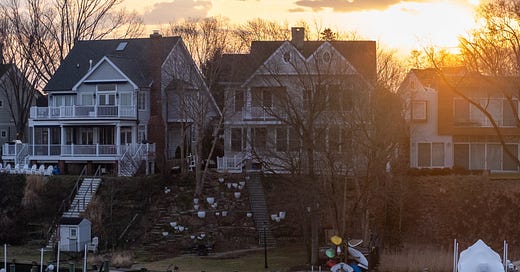It wasn’t a spectacular sunrise by Spa Creek standards but being alive is spectacular enough. I did enjoy our late morning walk as we are one day closer to spring.
You know I welcome feedback so I am happy to report on a piece I received early this afternoon so I can ask you to reflect on the same point. The reader was musing about my column last week on undergraduate majors and the value of liberal arts thinking. He rejected, based on his admittedly anecdotal life in the academic world, the idea that those trained in liberal arts are actually open-minded. This reader offered that his experience shows that STEM, or the broader approaches required to be problem-solvers leads to open-mindedness rather than exposure to a variety of subjects in the humanities. He was also convinced that engineering, because it is problem-solving, is a terrific example of how too many humanities-based folks don’t think.
Hmmm.
People respond to incentives. Far too many scholars today are narrow because the reward structures in their fields prefer specialisation rather than looking at interrelationships at higher levels. Time is crucial so one dedicates it to either breadth or depth with the latter more highly lauded by colleagues today.
I too believe that breadth and problem solving is indeed what matters in the twenty-first century considering the panoply of profound challenges facing us. But this reader’s question raises a completely different line of inquiry for me: is what matters a person’s educational path or is it her personality?
I don’t know. I have been involved with scholars for half a century. My two wonderful mentors who I had the privilege to see last week are outgoing, funny, captivating, and fully embracing of the world. The male professor retired in 2010 and has seen virtually every place in the world. He linked what he saw over decades to his introduction to western civilisation courses while teaching, and to conversations with anyone and everyone after retirement. He never seems to slow.
The female professor is incredibly sharp, covering the Middle East at a time of enormous turmoil, always looking for solutions and questioning conditions affecting the environment. She is my model for a reason as she raised kids, was married to a similarly renowned violist, and is deeply involved in her faith in her 80s. She seeks to find solutions, not merely to kvetch about problems. She is a well known scholar in her field as well as a superb educator.
I have also known academics who are afraid to open the door to their offices for fear of criticism or questions or seemingly their own shadows. I have long felt that many folks with wounded egos go into scholarship to prove they can shine in a tightly controlled element but then don’t have to be involved with anyone in other fields (or even in life). To each, her or his own.
But, personality strikes me as important as much as the field. Then again, it’s also likely not an either or situation but a gradation along a spectrum of inquisitiveness or closed mindedness or something. (Yes, there are spectra besides Asperger’s to describe people.)
Thoughts? For those of you mercifully not academics, how do you see the importance of field of study versus personality? Or is it something completely different like which astrological sign each person espouses (kidding, just kidding)?
I welcome your thoughts, rebuttals, queries, and consideration. We desperately need problem solving now yet we definitely seem to breed less tolerance for ambiguity that problems often require.
Thank you for reading this column today and any day. Please feel free to circulate it if you think it of value. Thank you especially to those who pay for subscriptions.
Be well and be safe. FIN





I’m going to give a bit more thought to my answer before sharing. My immediate instinct is breadth over depth, but then I go back to both my own training and personality. In law school we were trained how to think, to learn, to spot issues that needed to be solved, and to set aside those that couldn’t be or didn’t need to be addressed. I value breadth, _for myself_, and surround myself with those who have either breadth or depth depending on need. And working to assemble grant teams for diverse government programs and organizations gave me an appreciation of both, too. I love to learn, occasionally to learn deeply, but just as often to learn sufficiently deeply to know when I need someone with depth. Putting together the big picture with a liberal arts and law background, after serving as a technician with deep knowledge of electronic and computer systems connected to mechanical systems might also have influenced my perspective having been stationed somewhere we had to problem solve broadly.
What a good topic of discussion! Back later with more.